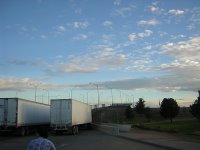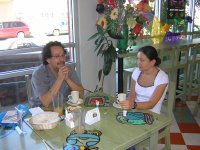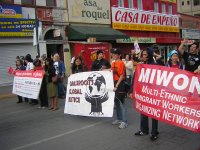by Arnoldo Garcia & Colin Rajah
transcribed by Diana Pei Wu
The Border Social Forum (Foro Social Fronterizo), part of the World Social Forum process, was held in Ciudad Juárez, Chihuahua México, on the US-Mexico border with EL Paso, TX from Oct 13th-15th, 2006. Some 1000 people, representing social justice, immigrant rights and labor organizations, as well as indigenous communities, farmworkers, women, youth, African-Americans, and many others, converged on Juárez.
 Ciudad Juárez is considered a laboratory for neoliberalism. The first maquiladoras of the global assembly lines, were first implemented in Juárez in the 1960s. It is also the site of mass repression against women maquiladora workers, including dozens of unaccounted murders. In this setting, all the discussions and program sessions were focused on creating alternatives to the militarized border where thousands of women, men and children have died as the result of US border policies and the US Department of Homeland Security.
Ciudad Juárez is considered a laboratory for neoliberalism. The first maquiladoras of the global assembly lines, were first implemented in Juárez in the 1960s. It is also the site of mass repression against women maquiladora workers, including dozens of unaccounted murders. In this setting, all the discussions and program sessions were focused on creating alternatives to the militarized border where thousands of women, men and children have died as the result of US border policies and the US Department of Homeland Security.THURSDAY, Oct 12

Prior to the official opening of the Border Social Forum, a number of border groups (including National Network member, the Agricultural Workers Center) organized a March Against NAFTA and Border Violence. Following that in the afternoon, participants embarked on a “border reality tour” to visit industrial sites and colonias (working class neighborhoods).
FRIDAY, Oct 13

The Border Social Forum had 14 themes or tracks of discussions, workshops, actions and proposals, including Globalization & Integration, US-Mexico Relations, Women & the Border, Labor & Workers, Environment & Justice, Health, Indigenous Peoples, Children & Elders, Youth, Human Rights, Art & Culture, Education & Communication, Food Sovereignty, and of course, Migration.
 The organizers kicked-off the Migration track with an opening panel on Migrant Struggles, that discussed the significance of the mass mobilizations in the past year. The panel opened with a presentation by National Network staff member Arnoldo Garcia who described the history of state repression in the region.
The organizers kicked-off the Migration track with an opening panel on Migrant Struggles, that discussed the significance of the mass mobilizations in the past year. The panel opened with a presentation by National Network staff member Arnoldo Garcia who described the history of state repression in the region. Other National Network members also mainly participated in the Migration track. Coalicion de Derechos Humanos from Arizona, Desis Rising Up & Moving -DRUM from New York, South Asian Network - SAN and Communities for Humane Immigrant Rights of Los Angeles - CHIRLA (both from Los Angeles), St. Peter’s Housing from San Francisco, Colonias Development Council and Agricultural Workers Center (both from the border in Texas), as well as NNIRR Board member Susan Alva, led an organizing workshop called “Building Walls, Destroying Rights: The International Implications of Immigration Legislation.” This workshop analyzed the panorama of anti-immigrant legislation, the immigrant fightback, and a proposal from the National Network for a US campaign for equity, liberty & justice.
Other National Network members also mainly participated in the Migration track. Coalicion de Derechos Humanos from Arizona, Desis Rising Up & Moving -DRUM from New York, South Asian Network - SAN and Communities for Humane Immigrant Rights of Los Angeles - CHIRLA (both from Los Angeles), St. Peter’s Housing from San Francisco, Colonias Development Council and Agricultural Workers Center (both from the border in Texas), as well as NNIRR Board member Susan Alva, led an organizing workshop called “Building Walls, Destroying Rights: The International Implications of Immigration Legislation.” This workshop analyzed the panorama of anti-immigrant legislation, the immigrant fightback, and a proposal from the National Network for a US campaign for equity, liberty & justice.SATURDAY, Oct 14

Most members of the National Network, (such as Coalicion de Derechos Humanos, DRUM, SAN, CHIRLA etc.) organized separate workshops on border violence and militarization. DRUM's workshop tied the militarization along the US-Mexico border to that in Palestine. The National Network also participated in a workshop organized by CHIRLA discussing interior immigration law enforcement issues, as well as one organized by the Grassroots Global Justice (GGJ) Alliance on "Black-Brown Alliance Building".
 Diverse community organizations and movements at the BSF presented a gamut of discussions, trainings, resources, video and audio to focus discussion on alternatives to the dominant forms of economic development now present. They also looked at the impacts of neoliberalism from indigenous peoples; land use to environmental justice to workers rights and all the challenges that variouos peoples (indigenous communities, working people and people of color) are facing.
Diverse community organizations and movements at the BSF presented a gamut of discussions, trainings, resources, video and audio to focus discussion on alternatives to the dominant forms of economic development now present. They also looked at the impacts of neoliberalism from indigenous peoples; land use to environmental justice to workers rights and all the challenges that variouos peoples (indigenous communities, working people and people of color) are facing. Saturday culminated in a march to the border and symbolic shutdown of it. It was estimated that more than 2000 people took part in this mass march that called for an end to the Border Wall of Death, and the rescinding of militarization at the border, as well the legislation and rhetoric that promotes it.
Saturday culminated in a march to the border and symbolic shutdown of it. It was estimated that more than 2000 people took part in this mass march that called for an end to the Border Wall of Death, and the rescinding of militarization at the border, as well the legislation and rhetoric that promotes it.SUNDAY, Oct 15
 Each of the tracks presented a series of conclusions and proposals for action as a followup to the BSF. The National Network presented its proposal for a national campaign in the US to organize a national dialogue on the type of border communities want. This would feature human rights, solidarity and bringing diverse communities to meet their counterparts at the US-Mexico border to challenge the existing militarization and impunity at the border.
Each of the tracks presented a series of conclusions and proposals for action as a followup to the BSF. The National Network presented its proposal for a national campaign in the US to organize a national dialogue on the type of border communities want. This would feature human rights, solidarity and bringing diverse communities to meet their counterparts at the US-Mexico border to challenge the existing militarization and impunity at the border. The outcomes from the Migration track recognize that the mass mobilizations of 2006 were the result of organized communities, especially over the last 10 years of work. It also emphasized that the current border militarization is part of the low intensity war being waged against migrants and border communities. The Migrant track put forth that toppling the border wall and ending militarization was a top priority.
The outcomes from the Migration track recognize that the mass mobilizations of 2006 were the result of organized communities, especially over the last 10 years of work. It also emphasized that the current border militarization is part of the low intensity war being waged against migrants and border communities. The Migrant track put forth that toppling the border wall and ending militarization was a top priority.The BSF participants by acclamation will organize a campaign to defend the rights of communities at the border to stop hate crimes and link it to stopping the war abroad as well. There is also a proposal for organized actions including boycotts and work stoppages for May 1, 2007. And finally, there are plans to hold a 2nd Border SF that is to held on Mexico’s southern border.

27 comments:
Post a Comment